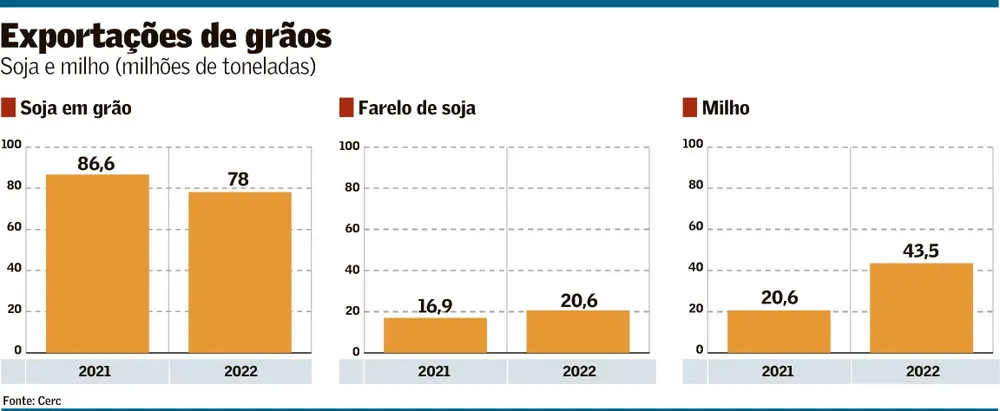Brazilian corn shipments confirmed expectations and more than doubled in 2022, in line with the recovery of the harvest after the severe crop failure in the previous year. And, as shown by data released yesterday by the National Association of Cereal Exporters (Anec), sales of soybeans to the foreign market were unable to withstand the drop in production in the South region and in part of Mato Grosso do Sul and fell, in one of the few declines in exports in the last decade.
According to Anec, corn exports reached a record 43.1 million tons last year, or 109.4% more than in 2021. In December, shipments of the cereal grew 75.4% compared to the last month of the previous year, to 5.8 million tons. And the pace is expected to remain strong in January. According to the entity, the volume will reach 4.3 million tons, an increase of 94.6% compared to the same month in 2021. Soybean grain exports fell 10.2% in 2022, to 77.8 million tons. In December, the volume was 1.5 million tons, 40.2% lower than in the last month of 2021. Since 2013, this was only the third annual drop, all of them resulting from crop failures caused by climate problems. Anec projects that, this month, shipments will remain weak, since the 2022/23 harvest is still in its early stages. The expectation is that 1.3 million tons will be shipped, a volume 42.4% lower than that of a year ago. Soybean meal shipments grew 21% over the past year, to 20.4 million tons – despite having fallen 10.8% in December, to 1.4 million tons. For January, the forecast is for a new drop of 15.4%, to 1.3 million tons. According to the Brazilian Association of Vegetable Oil Industries (Abiove), meal shipments tend to remain stable this year, but, with the increase in production, exports of the grain should grow to 93 million tons.
In the case of wheat, finally, Anec reported that Brazil sent 3.2 million tons abroad in 2022, which represented an increase of 188.8% compared to the previous year. In December, the total was 689.2 thousand tons, a higher volume than the 538.6 thousand tons in the same month of 2021. Brazilian exports of the cereal gained strength with the good harvest and the increase in demand, a reflection of the war between Russia and Ukraine, two countries that are normally large exporters.
Source: Jornal – Valor Econômico

